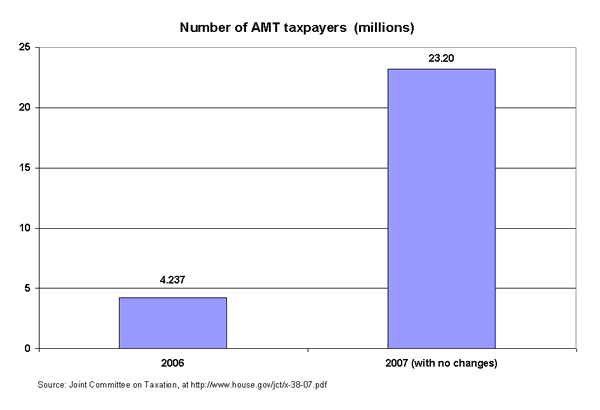See Snapshots archive.
Snapshot for November 7, 2007.
Fixing the Alternative Minimum Tax
by John Irons
Congress is currently considering legislation that would prevent millions of taxpayers from seeing tax increases via the Alternative Minimum Tax (AMT).
The AMT was enacted in 1969 in response to reports that several very high-income individuals had no tax liability. The AMT was initially designed to ensure that everyone paid at least something. Since that time, however, the AMT has affected more and more people. In recent years, the AMT has threatened to increase the taxes of middle-income taxpayers because it was not indexed to inflation and because the Bush tax changes enacted since 2001 also failed to adjust the AMT.
The AMT, if unchanged, would increase tax payments for 23 million taxpayers this year. Under a plan proposed last week by Representative Charles Rangel and approved by the Committee on Ways and Means, the AMT would be indexed to inflation for 2007 to prevent this tax hike on increasingly middle-income earners. Rangel’s AMT plan aims to be fiscally responsible by paying for the cost of this “fix,” in part, by closing the loophole on carried interest—a provision that would ensure that private equity and hedge fund managers would be taxed fairly on their income. (Another important provision in the Rangel bill would expand the eligibility of the child tax credit so that millions more low-income families would receive new or expanded benefits.)
Rangel had put forth a more expansive version of tax reform in a bill two weeks ago that called for the elimination of the AMT alongside a number of other tax changes. In that bill, the revenue lost from the AMT would be paid for through a surtax on high-income individuals. Other changes—including an increase in exemption levels, expanded eligibility for the child tax credit, and enhancements to the Earned Income Tax Credit—would mean that most people earning under $500,000 would see a tax reduction, while those that benefited the most from the Bush tax changes would see an increase. (See the Tax Policy Center for full distributional details.)
Most observers believe that congress will act soon to prevent this tax increase by indexing the AMT to inflation for this year only, with the broader bill to be debated next year. However, whether the changes will be paid for (as in Rangel’s plan) or instead added to the deficit (an additional $50.6 billion over 10 years) remains an open question.

